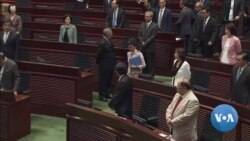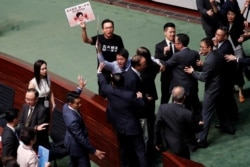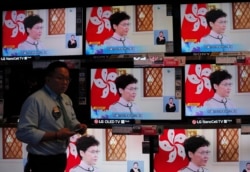HONG KONG — Hong Kong Chief Executive Carrie Lam on Wednesday was forced to abruptly end and walk out on her annual policy address to the legislature by jeering lawmakers.
Pro-democracy legislative council members, some wearing masks of Chinese President Xi Jinping, disrupted Lam's speech with shouts of "five demands, not one less," referring to protester calls for democratic reforms that include universal suffrage, amnesty for democracy activists and an independent investigation into alleged abuses by police.
Hong Kong has been embroiled in four months of disruptive democracy demonstrations that began with opposition to a now withdrawn extradition bill, which reinforced concerns from many that China is intent on undermining Hong Kong's autonomy guaranteed under the "one country-two systems" agreement.
Internal affairs
The chief executive later addressed the legislature by video link and said her government will uphold Hong Kong's autonomous status, but would not tolerate calls for independence or anything that hurts China's national security and sovereignty.
She also criticized the United States and other foreign nations, urging them not to get involved in Hong Kong's affairs.
"It's extremely inappropriate for foreign parliaments to interfere" in Hong Kong's "internal affairs in any way," Lam said, adding that her government "will not allow (the United States) to become a stakeholder" in Hong Kong matters.
The U.S. House of Representatives on Tuesday unanimously passed legislation that could impose sanctions on Hong Kong for suppressing basic rights and has barred the exports of military and crowd-control items that Hong Kong police could use against demonstrators. The Senate has not yet scheduled to vote on these measures.
China's foreign ministry accused the U.S. lawmakers of "sinister intentions" to undermine Hong Kong's stability and warned that bilateral relations would be damaged should the measures become law.
Undermining violence
Lam also voiced concern about the ongoing protests that, she said, caused injuries to more than 1,100 people and the arrest of more than 2,200 others; and the violence committed by some activists, including attacking police with bricks and gasoline bombs and destroying subways stations and businesses deemed pro-Beijing.
Outside the legislative council on Wednesday morning, a small group of protesters held a demonstration, criticizing Lam as a puppet of Beijing. Many protesters support the more aggressive tactics being employed by some activists to increase economic and political pressure on the government, as peaceful demonstrations alone have not been effective.
"When we use some peaceful way to express our opinion, they don't listen," said one protester.
However, Randall Schriver, the assistant secretary of defense for Indo-Pacific Security Affairs,
on Tuesday voiced concern about "some of the tactics used by demonstrators in Hong Kong." But he also emphasized Washington's support for Hong Kong's autonomy and said Beijing's "heavier hand" in Hong Kong is worrisome.
Some analysts have said that acts of violence by radical elements in the democracy movement risk undermining public support, and could give Beijing and the Hong Kong government an excuse to take harsher measures in the name of public safety.
Economic anxiety
Lam has refused to make any concessions to the protesters, but in her speech to the legislature she did address some of the economic concerns that, many say, contribute to the political unrest.
She promised to increase housing projects and cap rising property values that have prevented many young people in Hong Kong from buying a home, and to cut public transportation costs.
Leung Kwok-hung, also known as "Long Hair," a longtime democracy activist, said these economic proposals will not change widespread public support for significant democratic change.
"Maybe they can deliver big pieces of candy, but it will not solve the problem of Hong Kong at this moment," said Leung, who is one of four former legislative council members stripped of their seats in 2017, for making defiant gestures during the swearing-in ceremony.
Lam also noted that the economy has slipped into a technical recession since the third quarter, and that violence has damaged Hong Kong's international image and undermined its attractiveness to overseas investors.









